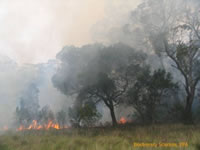Fire management guidelines

Download fire management guidelines .
Citation: Queensland Herbarium (2024) Regional Ecosystem Fire Guidelines (May 2024) (Queensland Department of Environment, Science and Innovation: Brisbane).
The guidelines are from an ecological perspective, designed to maintain and enhance biodiversity.
Fire has played an important role in shaping much of the Australia's landscapes and the composition of the fauna and flora within them. Manipulating fire to create or protect desirable landscape features and habitats has become of primary importance at all levels of land management.
Guidelines for regional ecosystems
The guidelines are based on quantitative and qualitative information from the published literature and expert observation and opinion.
Disclaimer
Further research and monitoring is required to improve the guidelines. The guidelines are from an ecological perspective assuming ‘typical’ climatic conditions for the regional ecosystem, and are designed to maintain and enhance biodiversity. In areas where the protection of infrastructure is of primary importance, these guidelines may not be applicable. The guidelines are reviewed and updated as additional data becomes available. While every effort has been made to ensure the information presented is as reliable as possible, the State of Queensland accepts no liability and gives no assurance in respect of its accuracy and shall not be liable for any loss or damage arising from its use.
Conducting a planned burn
These guidelines are to be considered in conjunction with the many other deliberations and decisions undertaken when planning prescribed burns for reasons such as wildfire suppression, hazard reduction, timber production management and weed control. These considerations include the local conditions, e.g. weather, landforms, infrastructure, and safety of animals and people.
If you wish to conduct a planned burn, a written permit from a fire warden is essential. Please contact your local Rural Fire Service.
Burning and ecosystems
From an ecological perspective, prescribed burning for the myriad of ecosystems described in Queensland requires the right balance. You need to consider preventing fire-driven extinction of fauna and flora populations, and ecosystems, caused by inappropriate fire regimes (e.g. too frequent fires), but also the need to accommodate appropriate fire management to maintain species and ecosystems that require fire to persist.
The composition of an ecosystems' understorey, and its response to fire, is as critical in determining a suitable fire regime as is the general description provided by the regional ecosystem definition, detailing canopy and dominant species. Particular regional ecosystems can have a changing variety of understorey composition throughout a landscape.
Ecosystems in good condition
These generic guidelines are provided for regional ecosystems that are in ‘good’ condition, i.e. a condition relatively similar to the benchmark for that regional ecosystem.
Where the vegetation is heavily infested with weed species, the primary aim of the initial fire management may be to control the weeds, and hence a different fire regime to the ‘normal’ may be needed to restore the vegetation. Similarly, if the primary purpose of the management of an area is to enhance the population of a particular species, for example, an endangered plant or animal, then a different fire regime to the generic regime for the regional ecosystem may be required.
The generic guidelines also assume ‘typical’ climatic conditions for the regional ecosystem, hence extreme events or recent history such as droughts, cyclones or extra wet conditions may also alter the structure of the vegetation and require fire regimes that vary from the recommended ‘typical’ fire regimes.
Feedback
The draft guidelines are derived from the scientific literature and, due to the dearth of documentation of the effects of fire on many of our ecosystems, a panel of relevant professional experts for each bioregion. We welcome feedback from any person with information about the impacts of fire on any of the regional ecosystems. Email your feedback to Queensland.Herbarium@qld.gov.au.


